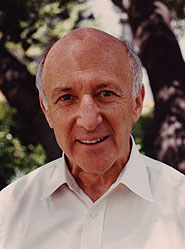Berkeleyan
Obituary
Leon Henkin
![]()
16 November 2006
 Leon Henkin (George Bergman photo) |
Leon A. Henkin, a professor emeritus of mathematics who labored much of his career to boost the number of women and underrepresented minorities in the upper echelons of that discipline, died of natural causes at his Oakland home on Nov. 1. He was 85.
Henkin was born in Brooklyn, N.Y., in 1921, the son of immigrant Russian Jews. He earned a B.A. in mathematics and philosophy from Columbia College (now Columbia University) in 1941, and an M.A. (1942) and a mathematics Ph.D. (1947) from Princeton University, where his dissertation supervisor was the famous logician Alonzo Church.
After completing his Ph.D. and two years of postdoctoral work at Princeton, he moved west in 1949 to the University of Southern California's math department before joining the Berkeley faculty in 1953. (Henkin declined an earlier invitation to come to Berkeley because of the required loyalty oath, which was declared unconstitutional in 1953.) He became a full professor in 1958 and retired in 1991.
Henkin served several years as vice chair of the Department of Mathematics, three times as acting chair, and from 1984-85 as chair. From 1959-60 he served as the first chair of Berkeley's pioneering interdisciplinary Group in Logic and the Methodology of Science. From1973 to '75 he was associate director of the Lawrence Hall of Science.
When Henkin came to Berkeley he had already established his reputation in the field of logic with a doctoral dissertation in which he produced a radically new proof of the fundamental Goedel completeness theorem. This theorem states that the axioms and rules of inference of basic ("first-order") logic are complete, that is, that they are sufficient to prove all logically valid sentences within the logic.
"The proof was recognized by leading logicians to be extremely original as well as shorter and easier to understand than Goedel's original proof," said logician John Addison, professor emeritus of mathematics. "It was based on a new technique, involving the use of so-called 'Henkin constants,' that became and remains one of the fundamental tools used in the branch of logic known as 'model theory,' now one of the four leading branches of mathematical logic."
Henkin also brought the tools of algebra to the study of logic, co-authoring the major work Cylindric Algebras (1971) with J. Donald Monk and Alfred Tarski. The late Tarski, a Berkeley math professor and one of the great logicians, helped build the campus into what many consider the world's leading center of mathematical logic; Henkin was his first major hire.
A pioneer for underrepresented students
Henkin was also a social activist who, in the 1960s, noticed that mathematically talented women and minority undergraduates were not pursuing math or math-related careers in college. In 1964 he spearheaded the formation of the Special Scholarships Committee at Berkeley, composed of Nobel laureates and top campus scholars, to study the problem and establish special-opportunity scholarships for disadvantaged students.
The program, which started out preparing high-school students to succeed in college and supporting them with Special Opportunity Scholarships, served as a model for the federal Upward Bound program, which was founded a year or two later, and for programs that sprang up at universities around the country. Henkin was chair of the Special Scholarships Committee for many years, stepping down after more than 40 years as a member only a year ago, though the committee designated him a "permanent guest member."
Henkin's former student, Uri Treisman, professor of mathematics at the University of Texas, Austin, is executive director of that campus's Charles A. Dana Center, which sets K-12 standards for Texas schools. He observed that "today there are several hundred programs aimed at ethnic-minority students and poor white students, and Henkin's model has become a dominant one. It affected the then-new movement to diversify engineering schools, for example, providing a core insight for them."
In the mid-1970s, Henkin and Treisman discovered that talented high-school students often failed to succeed in college because of unfamiliarity with the college environment and uncertainty about what was required to succeed in science and math. In 1974 they set up the Professional Development Program to address these problems, focusing on students in mathematics and math-related fields. Among the strategies they developed was to encourage group study as well as solo study, and to tell students with "rock-solid clarity" what is expected in order to succeed.
"We realized that what these kids needed was not a remedial program but an honors program," said Treisman. "That's what we created, and we produced a lot of kids who went on to become math majors and get Ph.Ds." The program proved so successful at promoting academic achievement among high-achieving minority undergraduates that it spawned clones throughout the campus. These programs were combined in 1992 and became the Coalition for Excellence and Diversity in Mathematics, Science, and Engineering, which is still going strong today.
Henkin was, appropriately, the first recipient of the Leon Henkin Citation for Distinguished Service, presented to a UC faculty member for "exceptional commitment to the educational development of students from groups who are underrepresented in the academy."
Henkin is survived by his wife, Ginette (Potvin) Henkin of Oakland; sons Julian of New York City and Paul of San Diego; and a sister, Estelle Kuhn of New York City.
A memorial service is scheduled for 3 p.m. on Saturday, Dec. 9, at the Bancroft Hotel, 2680 Bancroft Way, Berkeley. Contributions in Henkin's memory should be sent to the campus's Professional Development Program, 230-B Stephens Hall #5881, or to Doctors Without Borders.
- Robert Sanders

